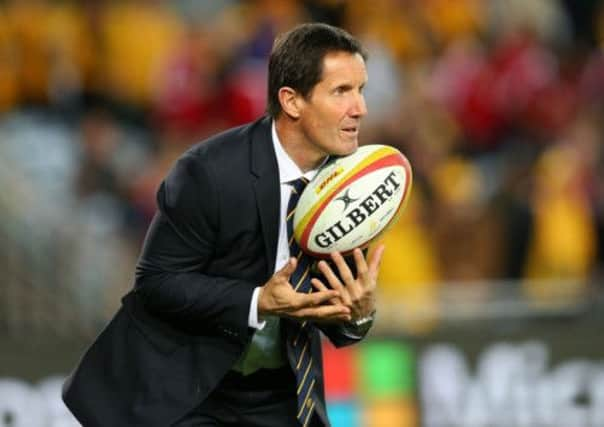Ewen McKenzie in line to replace Robbie Deans


Australia’s first foreign coach, the 53-year-old New Zealander is contracted until the end of the year, which would include the Wallabies’ season-ending northern hemisphere tour, but the ARU is unlikely to wait much longer, with two years left until the 2015 World Cup.
McKenzie, who coached Super Rugby side Queensland Reds to the southern hemisphere title in 2011 and was mentioned as a possible new Scotland coach before Vern Cotter landed the job, will be unveiled today as the Wallabies’ coach until the next World Cup, local media reported in Sydney yesterday. An ARU spokesperson declined to comment when contacted.
Advertisement
Hide AdAdvertisement
Hide AdThe ACT Brumbies’ World Cup-winning coach Jake White was also considered a strong candidate but eventually lost out to McKenzie, according to the reports.
The 2-1 series loss to the Lions, capped by a thumping 41-16 defeat in the Sydney decider on Saturday, offers the perfect excuse for the ARU to strike.
“One of the things we do at the end of a series like this is a review and that will be part of the review,” ARU boss Bill Pulver said in comments published by The Australian newspaper yesterday, referring to Deans’s tenure. “We’ll start that this week. It will be imminent. We need a brief cooling-off period to observe what happened.”
Prior to the Sydney Test, Pulver said Deans’s future would not hinge on the result of the Lions series, fuelling speculation that his fate had already been sealed.
Softly-spoken and unfailingly cagey, Deans has never endeared himself to a sceptical Australian public weary of New Zealand’s domination of the Wallabies over the past decade.
Although given a contract extension prior to the 2011 World Cup, Deans faced almost immediate calls for his sacking when Australia exited in the semi-finals, a performance most pundits Down Under regarded an under-achievement.
After a shock loss to Scotland on home soil last year, Deans held on to his job by guiding the Wallabies to a 3-0 whitewash of Wales.
Injuries put paid to the team’s hopes of winning the inaugural four-nation Rugby Championship, but Australia finished the season with a successful tour of Europe, marred only by a heavy loss to France.
Advertisement
Hide AdAdvertisement
Hide AdThe British and Irish Lions series was universally regarded as Deans’s last stand, however, given his failure to dislodge the All Blacks from the top world ranking.
Prior to the Sydney loss, Deans’s standing was already undermined by disciplinary problems within the Wallabies camp, with young playmakers James O’Connor and Kurtley Beale embarrassing the team by being photographed at a fast food outlet at 4am days before the second Test.
The pair escaped punishment at the selection table, leaving Deans appearing soft on discipline and all-too-willing to coddle favourites.
The 2007 appointment of Deans, a five-times championship-winning coach with Super Rugby’s Crusaders, polarised opinion and his successor is certain to do the same.
Long riven by factions drawn on provincial lines, Australia’s rugby administration is likely to announce a new candidate after a bruising backroom battle.
Conservative voices are demanding a return to a native coach in former Australia forward McKenzie, who offers the prospect of an entertaining brand of rugby, while South African White enjoys solid backing as the coach who took the Springboks to the 2007 World Cup.
Both sides agree, with Australia six weeks away from facing their nemesis New Zealand in the opening match of the Rugby Championship, that the decision needs to be made quickly.
“We were number five in the world when Robbie was appointed, we rose to number two and now we are number three. The board have to make a decision about how you get to number one – that is their task,” said the former ARU chairman Peter McGrath.